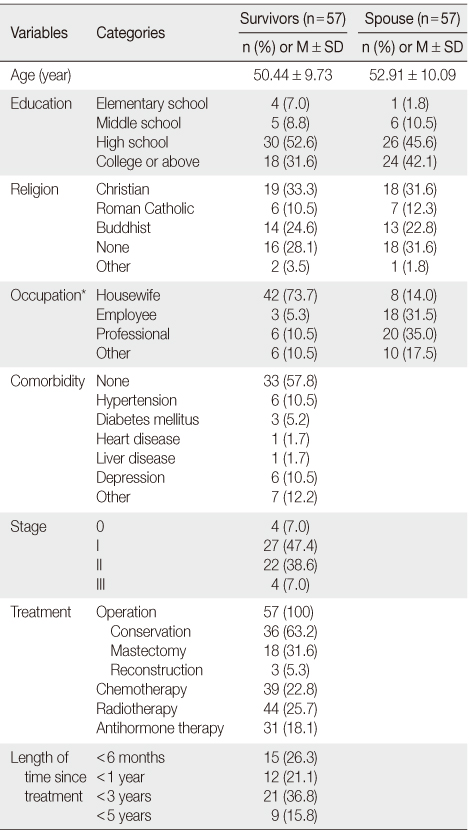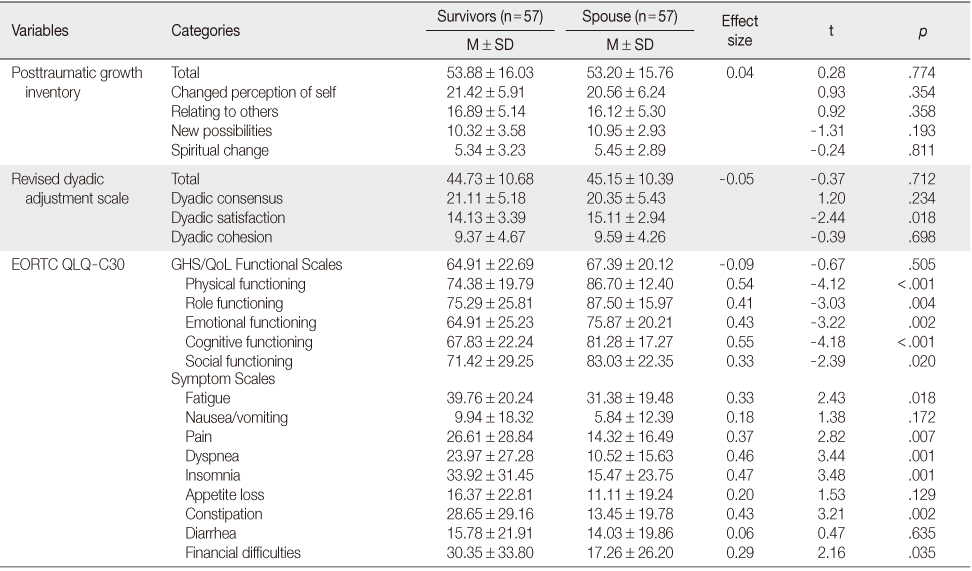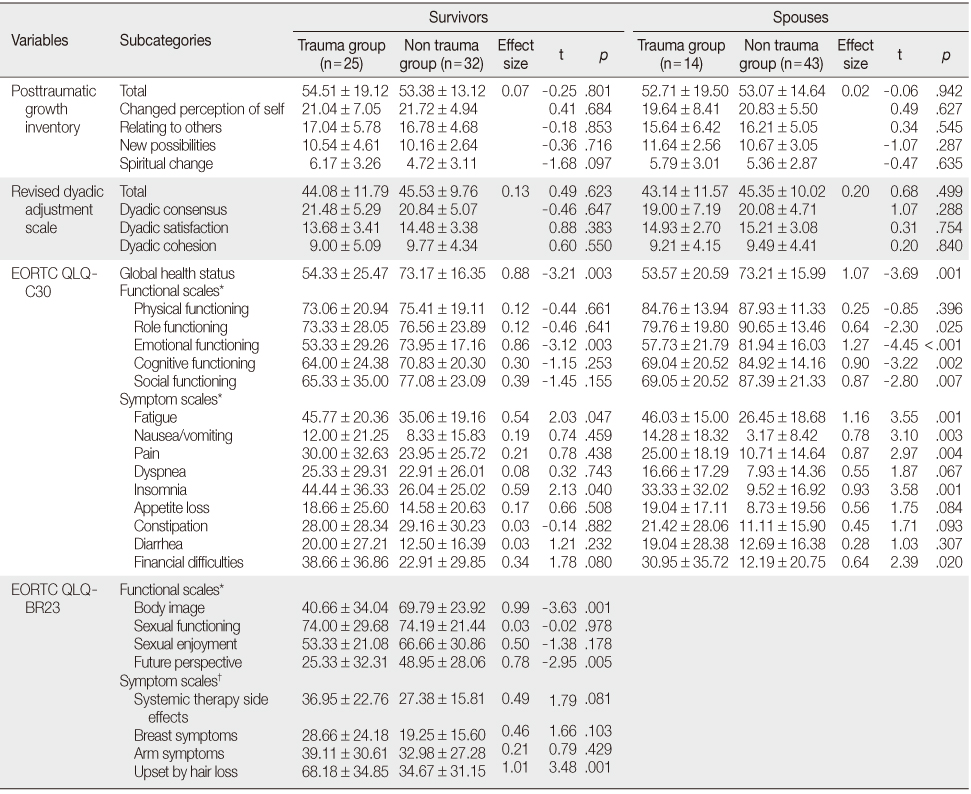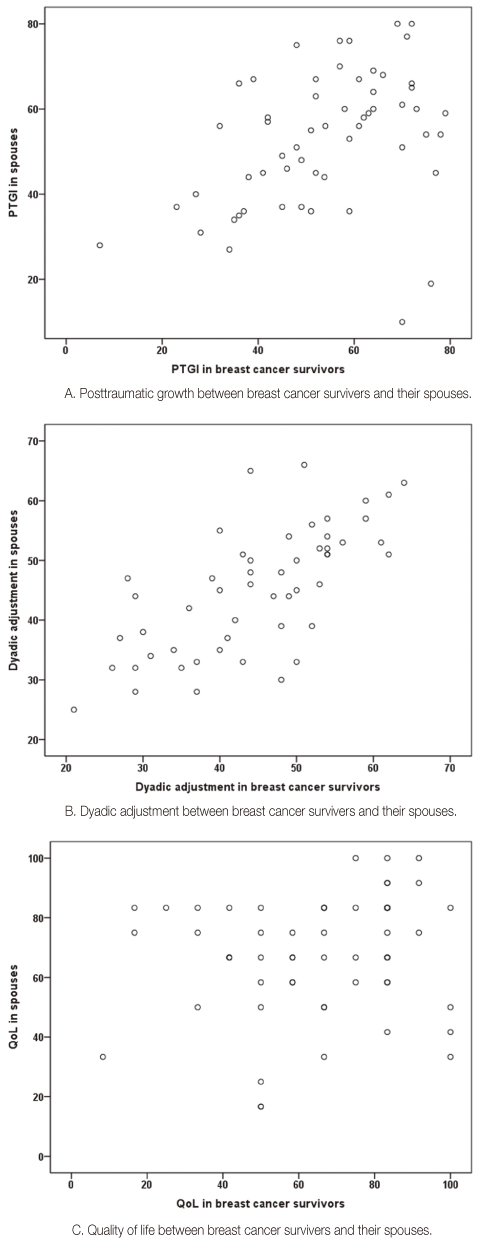Articles
- Page Path
- HOME > J Korean Acad Nurs > Volume 44(5); 2014 > Article
-
Original Article
- Posttraumatic Growth, Dyadic Adjustment, and Quality of Life in Breast Cancer Survivors and Their Husbands
- Seunghee Song, Eunjung Ryu
-
Journal of Korean Academy of Nursing 2014;44(5):515-524.
DOI: https://doi.org/10.4040/jkan.2014.44.5.515
Published online: October 31, 2014
1National Cancer Center, Goyang·Graduate School, Chung-Ang University, Seoul, Korea.
2Department of Nursing, Chung-Ang University, Seoul, Korea.
- Address reprint requests to: Ryu, Eunjung. Department of Nursing, Chung-Ang University, 84 Heuksuk-ro, Dongjak-gu, Seoul 156-756, Korea. Tel: +82-2-820-5681, Fax: +82-2-824-7961, go2ryu@cau.ac.kr
© 2014 Korean Society of Nursing Science
This is an Open Access article distributed under the terms of the Creative Commons Attribution NoDerivs License. (http://creativecommons.org/licenses/by-nd/4.0/) If the original work is properly cited and retained without any modification or reproduction, it can be used and re-distributed in any format and medium.
Abstract
-
Purpose
- The purpose of this study was to identify whether the couple perceived breast cancer as a traumatic event, to evaluate the association among posttraumatic growth, dyadic adjustment, and quality of life and to explore the predictors affecting quality of life of the couple.
-
Methods
- A cross-sectional comparative survey design was utilized. Participants were 57 couples recruited from a national cancer center in Korea. Data were analyzed using paired t-test, McNemar test and independent t-test. On the basis of variables found to be significantly associated with quality of life, multiple regression was used to examine the simultaneous influence of multiple predictors.
-
Results
- Breast cancers survivors and spouses perceived breast cancer as a traumatic event (43.9% and 24.6%, respectively). The global quality of life was explained by perception as trauma (β=-19.79) and posttraumatic growth (β=0.46) in survivors, and perception as trauma (β=-18.81) and dyadic adjustment (β=0.53) in spouses.
-
Conclusion
- Results suggest that future research should use qualitative methods to evaluate why contemplating reasons for cancer contributed to posttraumatic growth, examine other potential predictors of quality of life such as dyadic adjustment and intimacy, and identify links between posttraumatic growth and other psychological outcomes such as distress and well-being, using prospective analyses.
- 1. National Cancer Center. Cancer facts & figures 2014. Seoul: Ministry of Health & Welfare, National Cancer Center; 2014.
- 2. Lee S, Kim YJ. Posttraumatic growth of patients with breast cancer. J Korean Acad Nurs. 2012;42(6):907–915. http://dx.doi.org/10.4040/jkan.2012.42.6.907ArticlePubMed
- 3. Gallagher J, Parle M, Cairns D. Appraisal and psychological distress six months after diagnosis of breast cancer. Br J Health Psychol. 2002;7(Part 3):365–376. http://dx.doi.org/10.1348/135910702760213733ArticlePubMed
- 4. Maly RC, Umezawa Y, Leake B, Silliman RA. Mental health outcomes in older women with breast cancer: Impact of perceived family support and adjustment. Psychooncology. 2005;14(7):535–545. http://dx.doi.org/10.1002/pon.869ArticlePubMed
- 5. American Psychiatric Association. Diagnostic and statistical manual of mental disorders: DSM-IV-TR®. 4th ed. Arlington, VA: Author; 2000.
- 6. Tedeschi RG, Calhoun LG. The Posttraumatic Growth Inventory: Measuring the positive legacy of trauma. J Trauma Stress. 1996;9(3):455–471.ArticlePubMed
- 7. Yoo YS, Cho OH, Cha KS, Boo YJ. Factors influencing post-traumatic stress in Korean forensic science investigators. Asian Nurs Res. 2013;7(3):136–141.Article
- 8. Han IY, Lee IJ. Posttraumatic growth in patients with cancer. Korean J Soc Welf Stud. 2011;42(2):419–441.Article
- 9. Cordova MJ, Giese-Davis J, Golant M, Kronenwetter C, Chang V, Spiegel D. Breast cancer as trauma: Posttraumatic stress and posttraumatic growth. J Clin Psychol Med Settings. 2007;14(4):308–319. http://dx.doi.org/10.1007/s10880-007-9083-6ArticlePDF
- 10. Kim HJ, Kwon JH, Kim JN, Lee R, Lee KS. Posttraumatic growth and related factors in breast cancer survivors. Korean J Health Psychol. 2008;13(3):781–799.Article
- 11. Cha K, Kim K. Impact of uncertainty on resilience in cancer patients. Asian Oncol Nurs. 2012;12(2):139–146. http://dx.doi.org/10.5388/aon.2012.12.2.139ArticlePDF
- 12. Wagner CD, Bigatti SM, Storniolo AM. Quality of life of husbands of women with breast cancer. Psychooncology. 2006;15(2):109–120. http://dx.doi.org/10.1002/pon.928ArticlePubMed
- 13. Pistrang N, Barker C. The partner relationship in psychological response to breast cancer. Soc Sci Med. 1995;40(6):789–797.ArticlePubMed
- 14. Cho OH, Yoo YS. Psychosocial adjustment, marital intimacy and family support of post-mastectomy patients. J Korean Oncol Nurs. 2009;9(2):129–135.
- 15. Yang HC, Schuler TA. Marital quality and survivorship: Slowed recovery for breast cancer patients in distressed relationships. Cancer. 2009;115(1):217–228. http://dx.doi.org/10.1002/cncr.23964ArticlePubMed
- 16. Weiss T. Posttraumatic growth in women with breast cancer and their husbands: An intersubjective validation study. J Psychosoc Oncol. 2002;20(2):65–80. http://dx.doi.org/10.1300/J077v20n02_04
- 17. Song SH, Lee HS, Park JH, Kim KH. Validity and reliability of the Korean version of the posttraumatic growth inventory. Korean J Health Psychol. 2009;14(1):193–214.Article
- 18. Busby DM, Christensen C, Crane DR, Larson JH. A revision of the dyadic adjustment scale for use with distressed and nondistressed couples: Construct hierarchy and multidimensional scales. J Marital Fam Ther. 1995;21(3):289–308. http://dx.doi.org/10.1111/j.1752-0606.1995.tb00163.xArticle
- 19. Choi SI. Validity and reliability of the revised dyadic adjustment scale. Gho Hwang Ronjib. 2004;35:97–114.
- 20. Yun YH, Park YS, Lee ES, Bang SM, Heo DS, Park SY, et al. Validation of the Korean version of the EORTC QLQ-C30. Qual Life Res. 2004;13(4):863–868.ArticlePubMed
- 21. Yun YH, Bae SH, Kang IO, Shin KH, Lee R, Kwon SI, et al. Cross-cultural application of the Korean version of the european organization for research and treatment of cancer (EORTC) breast-cancer-specific quality of life questionnaire (EORTC QLQ-BR23). Support Care Cancer. 2004;12(6):441–445. http://dx.doi.org/10.1007/s00520-004-0632-3ArticlePubMedPDF
- 22. Koutrouli N, Anagnostopoulos F, Potamianos G. Posttraumatic stress disorder and posttraumatic growth in breast cancer patients: A systematic review. Women Health. 2012;52(5):503–516. http://dx.doi.org/10.1080/03630242.2012.679337ArticlePubMed
- 23. Assari S, Moghani Lankarani M, Tavallaii SA. Revised dyadic adjustment scale as a reliable tool for assessment of quality of marital relationship in patients on long-term hemodialysis. Iran J Kidney Dis. 2009;3(4):242–245.PubMed
- 24. Jeong Y. A study on the change of sensations after breast cancer surgery in the Korean women [master's thesis]. Daejeon, Chungnam National University. 2006.
- 25. Hwang E. Factors influencing quality of life in breast cancer patients with hormone therapy [master's thesis]. Seoul: Seoul National University; 2013.
- 26. Ruf M, Büchi S, Moergeli H, Zwahlen RA, Jenewein J. Positive personal changes in the aftermath of head and neck cancer diagnosis: A qualitative study in patients and their spouses. Head Neck. 2009;31(4):513–520. http://dx.doi.org/10.1002/hed.21000ArticlePubMed
- 27. Chang SS. Marriage counseling in Korean culture: Reality dynamic counseling approach. Korean J Psychol Soc Issues. 2006;12(5):117–131.
- 28. Lee IJ. Breast cancer in martial context: A critical review of the literature. Korean J Soc Welf Stud. 2009;40(1):37–61.
- 29. Couper J, Bloch S, Love A, Macvean M, Duchesne GM, Kissane D. Psychosocial adjustment of female partners of men with prostate cancer: A review of the literature. Psychooncology. 2006;15(11):937–953. http://dx.doi.org/10.1002/pon.1031ArticlePubMed
- 30. Badr H, Acitelli LK, Taylor CL. Does talking about their relationship affect couples' marital and psychological adjustment to lung cancer? J Cancer Surviv. 2008;2(1):53–64. http://dx.doi.org/10.1007/s11764-008-0044-3ArticlePubMedPDF
REFERENCES



*High scores indicate higher levels of functioning; †Higher scores indicate higher levels of symptoms; EORTC QLQ-C30=European Organization for Research and Treatment of Cancer Quality of Life Questionnaire-Core30;EORTC QLQ-BR23=European Organization for Research and Treatment of Cancer Quality of Life Questionnaire-Breast Cancer23.
Figure & Data
REFERENCES
Citations

- Structural Equation Model for Psychosocial Adjustment of Breast Cancer Survivors Based on Family Resilience Model
Jiyoung Seo, Myungsun Yi
Korean Journal of Adult Nursing.2022; 34(2): 178. CrossRef - Relationship among Post-traumatic Stress Disorder, Resilience, and Retention Intention in Nurses who had Perceived Traumatic Events
Jin Young Lee, Ja Yun Choi
Korean Journal of Adult Nursing.2022; 34(4): 403. CrossRef - Factors Associated with Post-Traumatic Growth in Patients with Breast Cancer Based on a Model of Post-Traumatic Growth
Hee Yeon Park, Ja Yun Choi
Asian Oncology Nursing.2022; 22(2): 65. CrossRef - Factors influencing posttraumatic growth in ovarian cancer survivors
Jeong Min Oh, Yoonjung Kim, Yeunhee Kwak
Supportive Care in Cancer.2021; 29(4): 2037. CrossRef - The effect of web-based training on life quality and spousal adjustment for women with breast cancer and their spouses
Saadet Çömez, Özgül Karayurt
European Journal of Oncology Nursing.2020; 47: 101758. CrossRef - Influence of lifestyle, depression, and marital intimacy on quality of life in breast cancer survivors
Su-Jin Seo, Ju-Hee Nho, Myoungha Lee, Youngsam Park
Korean Journal of Women Health Nursing.2020; 26(1): 28. CrossRef - The Influence of Spiritual Well-Being, Self-Esteem, and Perceived Social Support on Post-Traumatic Growth among Breast Cancer Survivors
Eun Young Seo, Suhye Kwon
Asian Oncology Nursing.2018; 18(4): 232. CrossRef - Effects of stress appraisal on the quality of life of adult patients with multiple myeloma and their primary family caregivers in Korea
In Seo La, Eun Kyoung Yun
Psycho-Oncology.2017; 26(10): 1640. CrossRef - Effects of stress, dyadic communication and adaptation on prostatectomy patients' quality of life
Hae Sook Kim, Han Jong Ahn
International Journal of Urological Nursing.2017; 11(1): 13. CrossRef - Posttraumatic growth in breast cancer survivors and their husbands based on the actor‐partner interdependence model
MyoSuk Lee, Kyunghee Kim, Changwon Lim, Ji‐Su Kim
Psycho-Oncology.2017; 26(10): 1586. CrossRef - Influencing Factors for Post-traumatic Growth in Patients with Breast Cancer
Sung-Hee Choi, Young-Whee Lee
The Journal of the Korea Contents Association.2016; 16(11): 499. CrossRef - Breast Cancer Survivors’ Mental Health Related to Attachment Injury and Marital Satisfaction
서미아, Dong-Young Noh, 민준원
Health and Social Welfare Review.2015; 35(3): 278. CrossRef

Figure 1
General Characteristics and Disease Characteristics of Breast Cancer Survivors and Their Spouses
*The variable has missing values.
Study Variable Mean Scores and Standard Deviations for Breast Cancer Survivors and Their Spouses
EORTC QLQ-C30=European Organization for Research and Treatment of Cancer Quality of Life Questionnaire-Core30; GHS=Global health status.
Comparison of Study Variables between Trauma and Non-trauma Groups in Survivors and Their Spouses
*High scores indicate higher levels of functioning; †Higher scores indicate higher levels of symptoms; EORTC QLQ-C30=European Organization for Research and Treatment of Cancer Quality of Life Questionnaire-Core30;EORTC QLQ-BR23=European Organization for Research and Treatment of Cancer Quality of Life Questionnaire-Breast Cancer23.
Factors Influencing Global Quality of Life in Breast Cancer Survivors and Their Spouses
*The variable has missing values.
EORTC QLQ-C30=European Organization for Research and Treatment of Cancer Quality of Life Questionnaire-Core30; GHS=Global health status.
*High scores indicate higher levels of functioning; †Higher scores indicate higher levels of symptoms; EORTC QLQ-C30=European Organization for Research and Treatment of Cancer Quality of Life Questionnaire-Core30;EORTC QLQ-BR23=European Organization for Research and Treatment of Cancer Quality of Life Questionnaire-Breast Cancer23.
 KSNS
KSNS
 E-SUBMISSION
E-SUBMISSION


 Cite
Cite

